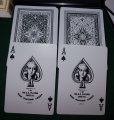Still working on the correct temperatures to speed up the process. Currently sitting around 4 hours. Quite a long time for a single deck of cards. I would say it gets about 90% of the warping out but not 100%. It makes them shuffleable and pitchable.
The process is virtually identicle to flattening chips. Heat, pressure and time. The major difference is that instead of baking chips I'm dehydrating cards.
I bought a new breville smart air convection oven because it will allow you to proof bread as low as 80 degress, dehydrate, air crisp and bake just like a regular oven. I originally tried proofing and then baking at low temperatures. I got very poor results. We have guessed that maybe warping is caused by moisture so I decided to try the dehydrate function. The cards were flipped on top of each other so they pushed against each other. I started at 90 degrees with slightly better results never using more than 20 minute intervals. Eventually I arrived at 120 degrees for 2 hours. Results were extremely promising. I let the cards cool and then resorted/mixed them and put them through the process again.
I used glass that I had around the house, 4 clamps and put 28/26 cards in each piece. I'm still playing with temps and will be trying much higher ones to see if I can improve the time.
The breville smart oven retails for 399.99 but a nesco dehydrator can be had for 69.99 and will run temps from 80 to 150 degrees.
This won't be worth the time or money for most people but its nice to know it can be done.
More pictures and info to follow.






The process is virtually identicle to flattening chips. Heat, pressure and time. The major difference is that instead of baking chips I'm dehydrating cards.
I bought a new breville smart air convection oven because it will allow you to proof bread as low as 80 degress, dehydrate, air crisp and bake just like a regular oven. I originally tried proofing and then baking at low temperatures. I got very poor results. We have guessed that maybe warping is caused by moisture so I decided to try the dehydrate function. The cards were flipped on top of each other so they pushed against each other. I started at 90 degrees with slightly better results never using more than 20 minute intervals. Eventually I arrived at 120 degrees for 2 hours. Results were extremely promising. I let the cards cool and then resorted/mixed them and put them through the process again.
I used glass that I had around the house, 4 clamps and put 28/26 cards in each piece. I'm still playing with temps and will be trying much higher ones to see if I can improve the time.
The breville smart oven retails for 399.99 but a nesco dehydrator can be had for 69.99 and will run temps from 80 to 150 degrees.
This won't be worth the time or money for most people but its nice to know it can be done.
More pictures and info to follow.






Last edited:




